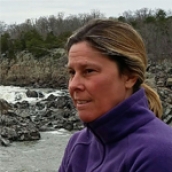JENNIFER J. SARA
The global water crisis is a matter of too much, too little, and too polluted. Flooding, drought, dirty waterways—all have made the news these past 12 months.

To respond to this crisis, the World Bank Water Global Practice launched a new Strategic Action Plan earlier this year, following extensive consultation with our partners and clients. It centres on three interrelated pillars: (1) sustain water resources, (2) deliver services, and (3) build resilience. We outlined how these critical areas contribute to the Sustainable Development Goals, and how our action plan will further strengthen our ability to help countries deliver on them.
First, the Water Global Practice supports clients’ efforts to enhance water security by managing water resources more productively and sustainably. Sustaining water means improving resource management at the river basin, country, and transboundary levels. Keeping watersheds and aquifers healthy is a responsibility that reaches across administrative, political, and sectoral boundaries. We will continue to value water across its competing uses and across sectors while supporting effective water and environmental policies, laws, and institutions for integrated water management.
Second, we help countries deliver universal water supply and sanitation services and optimize water use in agriculture. Through utility reform, we are incentivizing water and sanitation utilities to be accountable and efficient and thus achieve credit-worthiness. We continue to make sanitation a high priority while embracing a Circular Economy approach and following the principles of Citywide Inclusive Sanitation and the Sanitation Economy. We support governments’ efforts to achieve universal access, principally through national programs (based on policy, institutional, and regulatory reforms) and results-based-financing. To help deliver universal access in rural communities, we support innovative approaches to behavioural change, product and market development, micro-finance, and other interventions. Improving irrigation performance must be a strategic priority to tackle rural poverty and mitigate climate impacts, especially for the most vulnerable. We are also working on improving institutions for managing irrigation, improved water use efficiency and innovate farmer-led irrigation at scale.
Third, effective climate change adaptation requires sound water management to reduce vulnerability and build resilience. We help clients reduce flood and drought risks by financing water infrastructure, creating healthy watersheds, improving hydrological and meteorological services and access to data, and promoting planning processes that address climate uncertainty. We also support building resilience through operations in FCV (fragility, conflict and violence) countries, as they are often vulnerable to multiple shocks involving climate, conflict, migration, and weak governance.
These three pillars also form the core themes of the Water GP’s participation at this year’s World Water Week (August 25-30,2019). Organized by the Stockholm International Water Institute (SIWI), it’s the annual gathering where thousands of practitioners, policymakers and water professionals come together to generate ideas, share their experiences and advance solutions in water.
The World Bank will be convening and co-convening with partners a range of sessions covering various topics.
On August 25, our session “Quality Unknown” will present new research on the scale, scope, and economic impacts of declining water quality, as well as insights into the most appropriate policy solutions, following the launch of our flagship report on the same topic. The report, Quality Unknown: The Invisible Water Crisis, shows that the invisible crisis of water quality is eliminating one-third of potential economic growth in particularly polluted areas and threatening human and environmental well-being.
On August 28, at the “Revisiting Subsidies for Water Supply and Sanitation Services” session, we’ll be launching another new report by the Water GP. Titled Doing More with Less—Smarter Subsidies for Water Supply and Sanitation, this report looks at how subsidies can be powerful and progressive tools in delivering water and sanitation. Stay tuned as the report goes live in a few days!
Turning our attention to water sector utilities, we’ve gathered the latest evidence about the barriers and opportunities faced by women in water and sanitation utilities across the world. This material draws on recent analytical work and lessons learned from those working on the ground to narrow gender gaps at the utility level. The outcome of this work will be presented in the report, Women in Water Utilities: Breaking Barriers, which will be released at the World Water Week session on August 27.
From water quality and water subsidies to gender and many other issues that help shape the global debate in water, our sessions at World Water Week 2019 have a strong focus on how to work together on the three pillars—sustain water resources, deliver services, and build resilience—for a water-secure world for all.
Together with the two global trust funds housed within the Water GP—Global Water Security & Sanitation Partnership (GWSP) and 2030 Water Resources Group (2030 WRG), the four regional trust funds—Cooperation in International Waters in Africa (CIWA), South Asia Water Initiative (SAWI), Danube Water Program and Central Asia Energy-Water Development Program (CAEWDP)—and many other partners, we continue to implement programs and projects worldwide, convene a wide range of partners to achieve cross-sectoral solutions, and share data, knowledge and know-how across developing countries to help tackle the global water crisis.
Jennifer J. Sara is the Global Director, World Bank Water Global Practice. –
The Water Blog – World Bank




